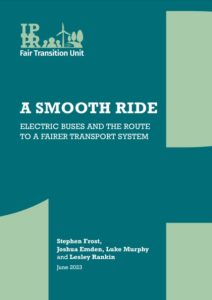Nearly 6,000 green buses needed by 2030 – IPPR research
More than 5,800 extra green buses are needed by 2030 in English regions outside London to reach net-zero and support the levelling up agenda, according to a new report from the Institute of Public Policy Research (IPPR).
up agenda, according to a new report from the Institute of Public Policy Research (IPPR).
The research notes the National Bus Strategy and Levelling Up White Paper committed the government to levelling up public transport across England to be ‘significantly closer to the standards of London’. The government has also committed to replacing existing diesel buses across the UK with 4,000 new green buses. However, as of May 2023, despite thousands of buses being nominally ordered or funded, only 87 zero emission buses were in use outside the capital.
The distance travelled by bus has also been declining for over 70 years and now cars and taxis account for over half (51.8%) of road emissions in the UK. To stay on track to reach net-zero, the UK must reduce the distance travelled by cars by at least 20% by 2030.
New IPPR analysis shows how a genuine commitment to levelling up bus services across England could result in substantial benefits for regions and the environment. By 2030, this would result in an increase of 2.7 billion bus journeys, an equivalent of 900,000 cars taken off the road, and emission reductions from cars and buses of 18%.
This would also result in an extra 5,800 green buses outside of London, meaning an increase of 22% of buses in Merseyside, 70% in the north east and 91% in West Yorkshire.
While more than 4,000 bus services have been lost in England in the last decade, only London and the south east have not seen a decline in the number of miles travelled by buses between 2004/5 and 2019/20. Regions such as the north east and north west have seen miles travelled by buses drop by almost 30% and with it, greater social isolation and less access to economic opportunities or cultural and social activities.
According to the report, this ‘deep-rooted regional unfairness’ means London has at least twice as many bus trips per person as any other metropolitan area in England. The capital had 245 bus trips per person in 2018/19, compared to 90 in the West Midlands, 67 in Greater Manchester and just 34 in Cambridgeshire and Peterborough.
To address what it describes as the disparity in bus services and level up transport connectivity across England, IPPR is calling for the government to:
- Phase-out the sale of new diesel bus sales by 2030 and make clear that the default choice of technology for buses is electric, not hydrogen
- Invest £2.5 billion by extending the funding of Zero Emission Bus Regional Areas (ZEBRA) between 2023-2030
- Set out a more ambitious transport decarbonisation plan which delivers a world-leading, clean and affordable, local public transport system
“The government’s National Bus Strategy committed to level up bus services across England and raise them to the same standard as London” – Joshua Emden, senior research fellow at IPPR
Joshua Emden, senior research fellow at IPPR, said: “The government’s National Bus Strategy committed to level up bus services across England and raise them to the same standard as London.
“Our analysis shows how a modest investment from government would deliver on these promises, decarbonise current and future bus fleets and have a transformative impact on local bus connectivity.”
“This action is crucial to reducing greenhouse gas emissions from transport” – Stephen Frost, principal research fellow at IPPR
Stephen Frost, principal research fellow at IPPR, said: “The Levelling Up White Paper sets out a mission to bring public transport across the country closer to London standards by 2030. To achieve this goal we need to go further than simply electrifying all our existing buses.
“To provide the same level of bus service in all English cities as is seen in the capital, we will need many more buses running on existing and new routes, and to redesign our urban areas to make public transport, walking, cycling, and wheeling the most affordable, pleasant, and efficient ways to travel.
“This action is crucial to reducing greenhouse gas emissions from transport, which is the UK’s highest emitting sector, growing local economies and making our transport system work better for people.”